2013年考研《英语》考前押密试卷(八)
-
Study the following two picturescarefully and write an essay of 160-200 words. In your essay, you should
1 ) describe the pictures briefly,
2) interpret the meaning of the pictures,and
3) give your comment.
You should write neatly on ANSWER SHEET2. (20 points)
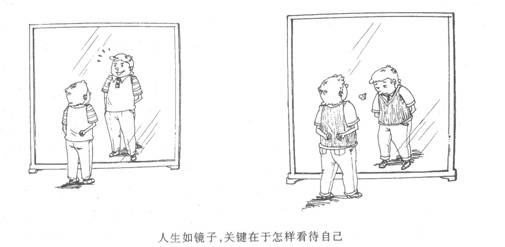
-
Write a letter of complaints according to thefollowing situation: You bought an air conditioner and had it installed theother day, but you found that the air-conditioning didn' t work when it operated.Write a letter to
1) point out the malfunction and
2) suggest some solutions.
You should write about 100 words onANSWER SHEET 2. Do not sign your own name at the end of the letter. Use"Li Ming" instead. You don' t have to write the address. ( 10 points)
-
__________。
-
__________。
-
__________。
-
__________。
-
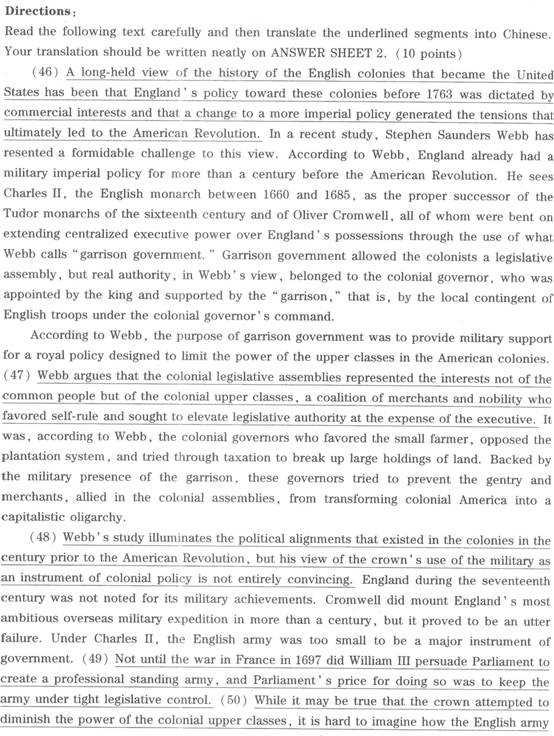

根据以上内容,回答1~5题。
__________。
-
__________。
-
__________。
-
__________。
-
__________。
-
Wh
- atcan
- be inferred about the ONS? [A] It often makes adjustments that favorthe administrators. [B] It often makes ne
- cessary technicalchanges to its figures. [C] It regar
- ds the Network Rail as a partof public sector. [D] It regards the National AuditOffice as its major rival.
-
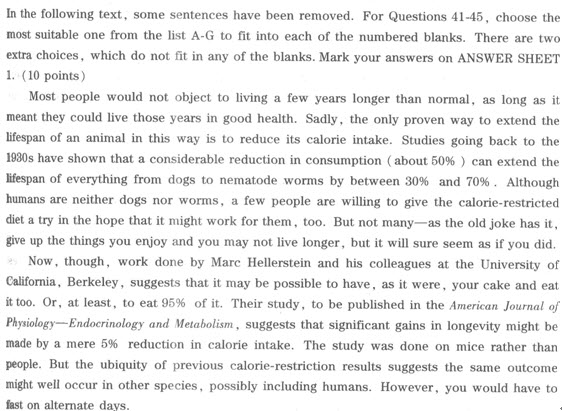
(41)
Cancer is the uncontrolled growth ofceils. For a cancer to develop efficiently, it needs multiple mutations to accumulate in the DNA o~the cell that becomes the tumor's ancestor.
(42)
A slower rate of cell division thusresults in a slower accumulation of cancer-causing mutations.
(43)
Heavy water is heavy because the hydrogenin it weighs twice as much as ordinary hydrogen(it has a proton and a neutron in its nucleus, instead of just a proton).
Chemically,however, it behaves like its lighter relative. This means, among other things,thatit gets incorporated into DNA as that molecule doubles in quantity during celldivision.
(44)
Dr Hellerstein first established how muchmice eat if allowed to feed as much as they want. Then he set up a group ofmice that were allowed to eat only 9595 of that amount. In both cases, he usedthe heavy-water method to monitor cell division. The upshot was that the rateof division in the calorie-restricted mice was 3795 lower than that in thosemice that could eat as much as they wanted--which could have a significanteffect on the accumulation of cancer-causing mutations.
(45)
[A] To stop this happening, cells haveDNA-repair mechanisms. But if a cell divides before the damage is repaired, thechance of a successful repair is significantly reduced.
[ B] Bingeing and starving is how manyanimals tend to feed in the wild. The uncertain food supply means theyregularly go through cycles of too much and too little food (it also means thatthey are often restricted to eating less than they could manage if food were omnipresent).
[C]But calorie-reduction is not all themice had to endure. They were, in addition, fed only on alternate days :bingeing one day and starving the next. So, whether modern man and woman,constantly surrounded by food and advertisements for food, would really be ableto forgo eating every other day is debatable.
[D] Why caloric restriction extends thelifespan of any animal is unclear, but much of the smart money backs the ideathat it slows down cell division by denying cells the resources they need togrow and proliferate. One consequence of that slow-down would be to hamper thedevelopment of cancerous tumors.
[E] So, by putting heavy water in thediets of their mice, the researchers were able to measure how much DNA in thetissues of those animals had been made since the start of the experiment (andby inference how much cell division had taken place ), by the simple expedientof extracting the DNA and weighing it.
[F] The second reason, according toElaine Hsieh, one of Dr Hellerstein's colleagues, is that cutting just a fewcalories overall, but feeding intermittently, may be a more feasible eatingpattern for some people to maintain than making small reductions each and everyday.
[G] At least, that is the theory. Untilnow, though, no one has tested whether reduced I calorie intake actually doesresult in slower cell division. Dr Hellerstein and his team were able to do sousing heavy water as a chemical "marker" of the process.
根据以上内容,回答1~5题。
__________。
-
Thepublic
- attitude towards official figures seems to
- be rather [A]
- confi
- dent. [B] incredulous. [C]optimistic. [D] critical.
-
Mr,Brown's budget surplus now looked respect
- able-sounding
- be
- cause [A] the exchange rate between poun
- ds anddollars is fairly stable. [B] less money was actually spent on themaintenance of major highways. [C] the Office for National Statisticsmade a revision of its figures. [D] Mr. Brown
-
Gordon Brown's m
- ajor concern is [A] whether he can deliver what he haspromised. [
- B] whether the budget is realisti
- c overthe economic cycle. [C] whether his government wins the nextelection. [
- D] whether the golden rule is a soundtheory.
-

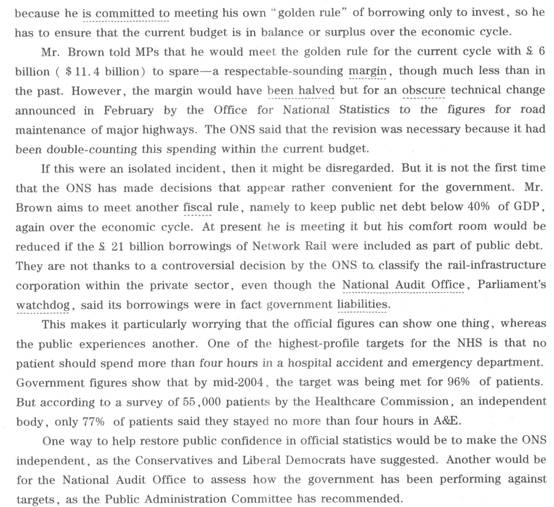
根据以上内容,回答16~20题。
Itcan be inferred from the first paragraph that
[A] the British politicians are oftencompared to boxers by the people.
[B] it is a common practice that thegovernment plays with figures.
[C] people often overestimate thecredibility of official statistics.
[D] the Labor government usuallyunderestimate its official figures.
-
Itc
- an
- be inferred from the passage that the author [A] sympathizes the "thoughtleaders" who are being used. [B] believes medi
- cal opinions shoul
- dnot be influenced by drug companies. [C] criticizes the practices of some drugcompanies indignantly. [D] proposes vigorous legal actionsagainst "thought leaders".
-
Which of the following is true
- about Pfizer? [A] Pfizer is a
- bran
- ch of the
- drug companyParke-Davis. [B] Pfizer has failed in its attempt toconceal certain information. [C] Pfizer is a part of the Drug IndustryDocument Archive. [D] Pfizer has done nothing illega
-
According to the p
- assage, drug company representatives [A] have received $250 to $500 a call, [
- B] have done nothing but listen. [
- C] are supervising the tone of theconferences. [
- D] are trying to meet their expectations.
-
Thephr
- ase "off-la
- bel" (paragraph 2 ) most probably means [A] without approval. [B] far from a label. [
- C] off-line. [
- D] without a label.
-
Which of the following is
- a reason for thelegalization of the hemp plant? [A]
- Both the hemp and the marijuana plantare healthy for people. [B] Produ
- ctive members of society
- dependon marijuana for production. [C] Only uneontrolled, long time usage ofmarijuana will result in addietion. [D]The hemp plant is a useful source forthe production of paper and pulp.
-

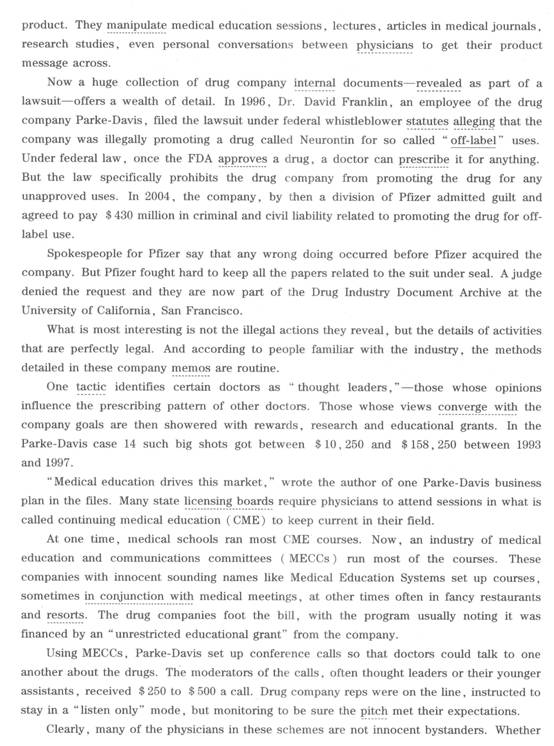

根据以上内容,回答11~15题。
Thedrug companies are willing to pay leading doctors to
[A] manipulate medical education sessions.
[B] improve the individual health-careservice.
[C] have personal contact withphysicians.
[D] help promote the drugs they produce.
-
According to some scientists, Hemps
- areprefera
- ble to trees
- chiefly because [A] they are more easily cultivate
- d. [B] they have been cultivated by manycultures for a long time. [C] they can produce more paper thantrees. [D] they can provide more endurablefibers than trees.
-
The
- author seems to imply in the passagethat [A] the grounds on which hemp is
- banned
- cannot be justifie
- d. [B] drug addiction is an even moreserious problem of the world. [C]American Presidents can beexempt from the punishment of law. [D] marijuana is an addictive drug thatshould be banned
-
Mr.M
- agee's attitude towards using videos in E-commerce seems to
- be [A] skepti
- cal. [B] critical. [C] supportive. [
- D] confused.
-
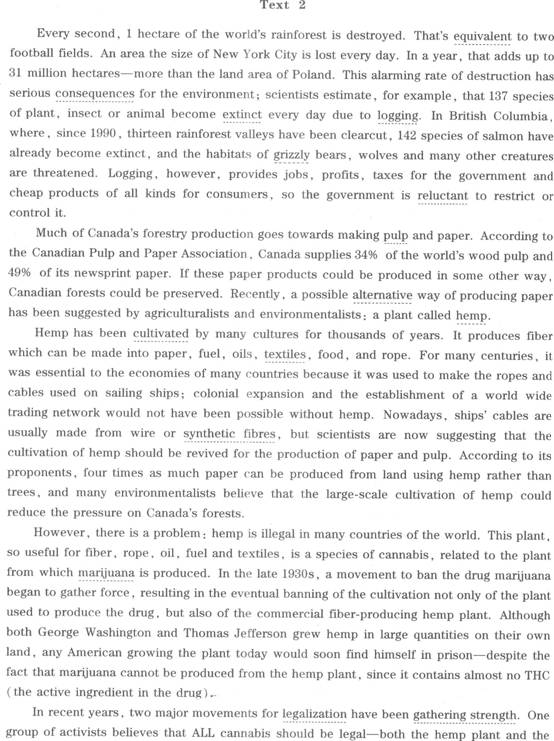

根据以上内容,回答6~10题。
Logging is not banned chiefly because
[A] scientists are overestimating thedamage.
[B] people benefit economically fromit.
[C] some creatures are only threatenedbut not endangered.
[D] it provides jobs to the consumers.
-
C
- anadian forests will not facedestruction if [A]alternative sources for paperproducts are found. [
- B] logging is banned by the lo
- calgovernment. [C] consumers increase theirenvironmental sensitivity. [
- D] Canadian Pulp and PaperAssociation reduce its production.
-
Itc
- an
- be inferred from the passage that [A] some people used to regard E-
- commerceas profit-loa
- ded. [B] E-commerce is no longer exploitable interms of profit. [C] QVC envisioned the adoption of videosin sales a decade ago. [D] polished video presentations must bemade in a high-tec
-
Theex
- ample of a customer
- buying a handbag is used to show that [A] visual
- confirmation an
- d productspecifications help improve online sales. [B] online shopping has its ownadvantages as well as disadvantages. [C] women are more attracted tophotographs of products than men buyers. &
-
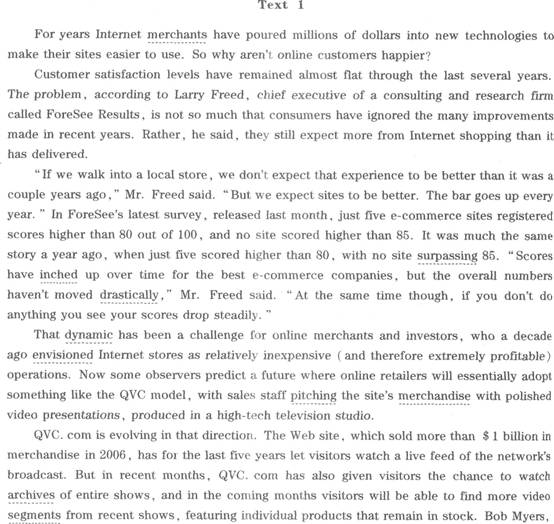
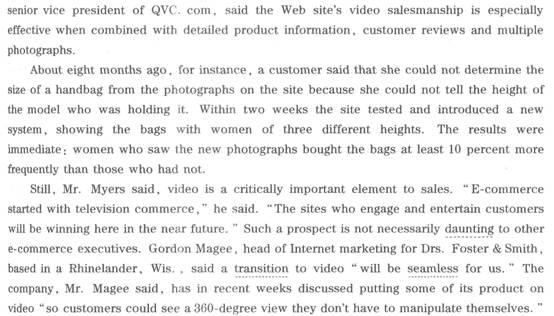
根据以上内容,回答1~5题。
Larry Freed attributed low customer satisfaction to the fact that
[A] consumers often failed to see theefforts made by Internet shops.
[B] customers' expectations exceed whatthe Internet shops are offering.
[C] consumer cognitive levels do not riseas easily as sellers believe.
[D] customers expect Internet merchantsto invest even more heavily.
-
Theresult of ForeSee's recent survey shows th
- at [A] there isn't a huge increase incustomer satisfaction. [
- B] some
- companies have to watch theirscores
- drop steadily. [C] E-commerce companies will soon fallout of business. [D] shopping experience in local storescan't be better.
-
__________。
[
- A]
- benefit [B] drawba
- ck [C] profit [
- D] advantage
-
__________。
[
- A]
- biggest [B] vastest [
- C]largest [
- D]greatest
-
__________。
[
- A] predominate&n
- bsp; [B] take [
- C] enlarge [
- D] monopolize
-
__________。
[
- A]elements&n
- bsp; [B] fa
- ctors [C] ingre
- dients [D] components
-
__________。
[
- A]so that&n
- bsp; [B] for that [
- C] in that [
- D] except that
-
__________。
[
- A] that&n
- bsp; [B]what [
- C] it [
- D] which
-
__________。
[
- A]prosper&n
- bsp; [B] improve [
- C] promote [
- D] flourish
-
__________。
[
- A]
- but [B] yet [
- C] still [
- D] then
-
__________。
[
- A] If&n
- bsp; [B] Be
- cause [C]Though [
- D] For
-
__________。
[
- A] transmitted&n
- bsp; [B] transferred [
- C] transforme
- d [D] transported
-
__________。
[
- A]through&n
- bsp; [B] in [
- C] on [
- D] between
-
__________。
[
- A] imagina
- ble [B]
- cre
- dible [C] workable [D] tangible
-
__________。
[
- A]competing&n
- bsp; [B] struggling [
- C] fighting [
- D] contending
-
__________。
[
- A]Provided that&n
- bsp; [B] In that [
- C] Now that [
- D] Given that
-
__________。
[
- A]poses&n
- bsp; [B]produ
- ces [C] makes [
- D] brings
-
__________。
[
- A]manufacturing&n
- bsp; [B] selling [
- C] allotting [
- D] purchasing
-
__________。
[
- A]more than&n
- bsp; [B]less than [
- C]than [
- D]rather than
-
__________。
[
- A]
- Be
- cause [B] Though [C] But
- D] If
-
__________。
[
- A]distinctly&n
- bsp; [B] notoriously [
- C] well-known [
- D] especially
-

根据以上内容,回答1~20题。
__________。
[A]admission
[B] access
[C] right
[D] command













